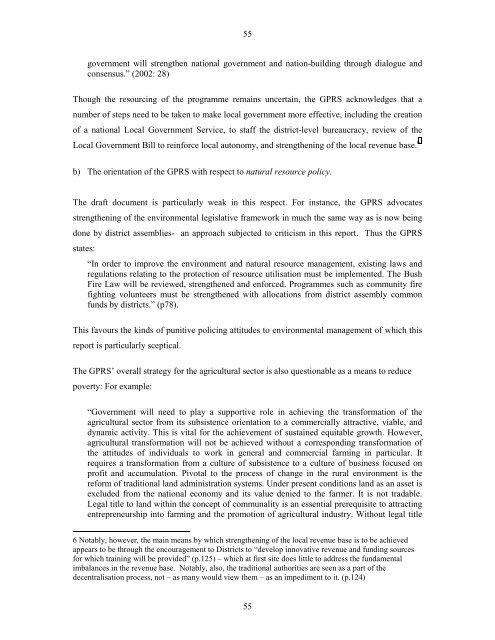Poverty Dimensions of Public Governance and Forest Management ...
Poverty Dimensions of Public Governance and Forest Management ...
Poverty Dimensions of Public Governance and Forest Management ...
Create successful ePaper yourself
Turn your PDF publications into a flip-book with our unique Google optimized e-Paper software.
55<br />
government will strengthen national government <strong>and</strong> nation-building through dialogue <strong>and</strong><br />
consensus.” (2002: 28)<br />
Though the resourcing <strong>of</strong> the programme remains uncertain, the GPRS acknowledges that a<br />
number <strong>of</strong> steps need to be taken to make local government more effective, including the creation<br />
<strong>of</strong> a national Local Government Service, to staff the district-level bureaucracy, review <strong>of</strong> the<br />
Local Government Bill to reinforce local autonomy, <strong>and</strong> strengthening <strong>of</strong> the local revenue base. 6<br />
b) The orientation <strong>of</strong> the GPRS with respect to natural resource policy.<br />
The draft document is particularly weak in this respect. For instance, the GPRS advocates<br />
strengthening <strong>of</strong> the environmental legislative framework in much the same way as is now being<br />
done by district assemblies- an approach subjected to criticism in this report. Thus the GPRS<br />
states:<br />
“In order to improve the environment <strong>and</strong> natural resource management, existing laws <strong>and</strong><br />
regulations relating to the protection <strong>of</strong> resource utilisation must be implemented. The Bush<br />
Fire Law will be reviewed, strengthened <strong>and</strong> enforced. Programmes such as community fire<br />
fighting volunteers must be strengthened with allocations from district assembly common<br />
funds by districts.” (p78).<br />
This favours the kinds <strong>of</strong> punitive policing attitudes to environmental management <strong>of</strong> which this<br />
report is particularly sceptical.<br />
The GPRS’ overall strategy for the agricultural sector is also questionable as a means to reduce<br />
poverty: For example:<br />
“Government will need to play a supportive role in achieving the transformation <strong>of</strong> the<br />
agricultural sector from its subsistence orientation to a commercially attractive, viable, <strong>and</strong><br />
dynamic activity. This is vital for the achievement <strong>of</strong> sustained equitable growth. However,<br />
agricultural transformation will not be achieved without a corresponding transformation <strong>of</strong><br />
the attitudes <strong>of</strong> individuals to work in general <strong>and</strong> commercial farming in particular. It<br />
requires a transformation from a culture <strong>of</strong> subsistence to a culture <strong>of</strong> business focused on<br />
pr<strong>of</strong>it <strong>and</strong> accumulation. Pivotal to the process <strong>of</strong> change in the rural environment is the<br />
reform <strong>of</strong> traditional l<strong>and</strong> administration systems. Under present conditions l<strong>and</strong> as an asset is<br />
excluded from the national economy <strong>and</strong> its value denied to the farmer. It is not tradable.<br />
Legal title to l<strong>and</strong> within the concept <strong>of</strong> communality is an essential prerequisite to attracting<br />
entrepreneurship into farming <strong>and</strong> the promotion <strong>of</strong> agricultural industry. Without legal title<br />
6 Notably, however, the main means by which strengthening <strong>of</strong> the local revenue base is to be achieved<br />
appears to be through the encouragement to Districts to “develop innovative revenue <strong>and</strong> funding sources<br />
for which training will be provided” (p.125) – which at first site does little to address the fundamental<br />
imbalances in the revenue base. Notably, also, the traditional authorities are seen as a part <strong>of</strong> the<br />
decentralisation process, not – as many would view them – as an impediment to it. (p.124)<br />
55
















